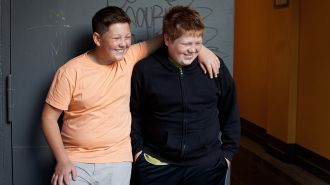
- Our studies
- Our research
- Publications and resources
- Data access and training
- About
- News
- Events
- Get in touch
- Join our mailing list

Welcome to our news and blogs section. Here you’ll find the latest developments and insights from across our longitudinal studies.

One in five young people born in the UK at the turn of the century was obese by the age of 14, and a further 15 per cent were found to be overweight.

Teenagers who read in their spare time know 26 per cent more words than those who never read, according to researchers at the Centre for Longitudinal Studies (CLS).
A round-up of selected journal papers and other research published in October using CLS study data.

Findings from cohort studies show that childhood disadvantage is strongly associated with poorer adult mental wellbeing for Generation X.

New research using the Millennium Cohort Study shows a quarter of girls (24%) and one in 10 boys (9%) are depressed at age 14.

Researchers have failed to find a causal link between children’s development and their relationships with their grandparents.

Eleven-year-olds who have tried cigarettes or alcohol show signs of switching off from school and are more likely to get into trouble, according to findings from the Millennium Cohort Study (MCS).

Support for children with emotional and behavioural problems may be more effective if targeted at those with both cognitive difficulties and depressed mothers, new findings suggest.

Children born to older mothers tend to show the most cognitive ability nowadays, when in previous generations they typically showed less promise.

The negative effect of low birth weight on cognitive ability has decreased dramatically for children born at the turn of the millennium, compared to the Baby Boomers and Generation X before them.

More generous benefits for families in Britain may explain better test scores for some children compared to the United States, according to research using the National Child Development Study (NCDS).

Children who are hyperactive are more likely to report poor mental health when they are adults, according to findings from the National Child Development Study (NCDS).
Ryan Bradshaw
Senior Communications Officer
Phone: 020 7612 6516
Email: r.bradshaw@ucl.ac.uk